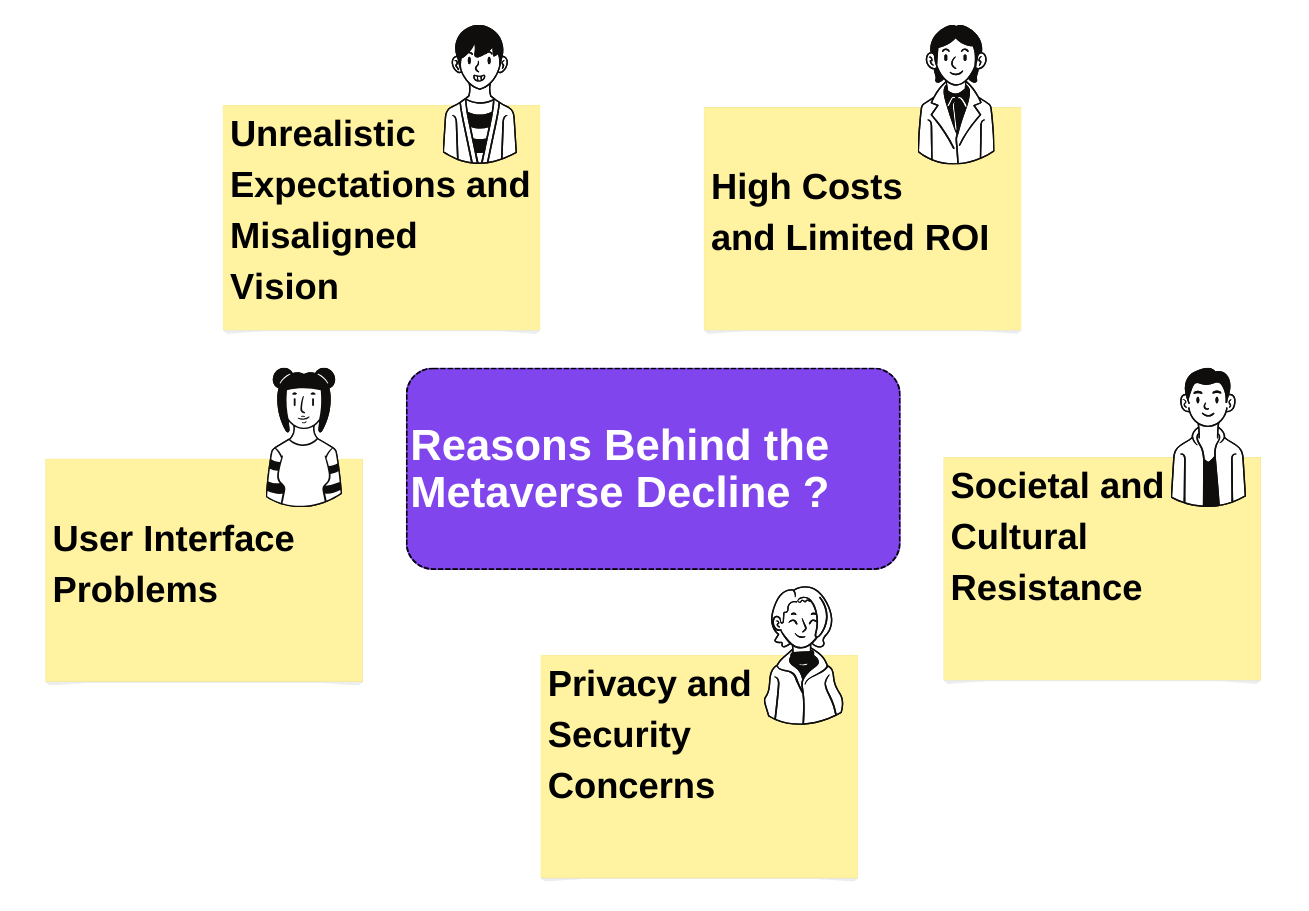The concept of the metaverse has fascinated tech enthusiasts, businesses, and future thinkers for years. People envisioned the metaverse as a digital world; where they could work, play, socialize, and do business. It was expected to change how we use technology and connect with others. Companies like Meta (formerly Facebook), Roblox, and Microsoft spent billions to create the tools and experiences needed to make this idea a reality.
However; despite the initial enthusiasm, the metaverse has failed to meet expectations, and many experts now call it a failure.
This article explores the reasons behind the metaverse’s decline, focusing on technical, financial, and societal challenges.

Unrealistic Expectations and Misaligned Vision
One of the main problems with the metaverse was the gap between public expectations and the actual deliverables. Early presentations showed picture of a smooth, lifelike virtual reality experience; where users could fully engage in realistic interactions. However, the technology needed to make this possible is—fast internet, powerful computers, and advanced VR/AR headsets. It is still either inaccessible or underdeveloped for the average consumer. For instance, critics targeted Meta’s Horizon Worlds for its cartoonish graphics, which sharply contrasted with the highly realistic images featured in its promotional materials.
Additionally, different companies followed different ideas for the metaverse, leading to fragmented ecosystems. Users experienced separate virtual spaces on platforms like Decentraland, Roblox, and The Sandbox, rather than a unified virtual environment. This lack of connection between platforms reduced the metaverse’s appeal and stopped its widespread adoption.
High Costs and Limited ROI
Even the largest corporations found the cost of creating and managing a metaverse infrastructure to be quite overwhelming. For instance, Meta spent over $36 billion on its Reality Labs division, which focused on metaverse development, but faced major financial losses in return. Therefore; these investments failed to attract enough user interest to justify the expenses.
Additionally, many businesses discovered that metaverse spaces often failed to generate profits. Virtual real estate was once a significant part of the metaverse economy. However, it lost value as companies and investors struggled to generate profits from these virtual assets. Brands that set up virtual stores or hosted events in the metaverse had trouble attracting large crowds, thus showing a gap between marketing hopes and how users actually behaved.
User Interface Problems
One of the biggest obstacles to metaverse’s success was its poor user experience. VR and AR technologies are vital for creating immersive metaverse experiences, but they are still bulky and expensive. High-quality headsets, such as Meta’s Quest 3 and HTC Vive remain costly for many consumers. Also, using them for long periods often cause discomfort; like motion sickness and eye strain.
Additionally, the metaverse’s interface was neither user-friendly nor engaging for a broad audience. For many users, navigating virtual spaces make them feel awkward and unnecessary, especially compared to existing options like live video games or social networking platforms. Thus, the excitement surrounding virtual environments faded quickly, and the lack of engaging content or clear benefits drove potential users away.
Privacy and Security Concerns
The metaverse presented significant data privacy and security risks, which hindered its adoption. Virtual environments collect a lot of data, such as biometric impressions, behavior patterns, and audio recordings. Moreover, reports of harassment, trolling, and virtual crimes, such as property theft and identity impersonation highlighted the need for strong moderation and safety measures. Consequently, enforcing rules in decentralized and user controlled environments proved difficult.
Societal and Cultural Resistance
Despite the tech industry’s efforts, the metaverse struggled to resonate with mainstream audiences. Many people viewed it as a niche product with limited practical applications. Many initially viewed the COVID-19 pandemic as a catalyst for metaverse adoption due to the surge in digital interactions. However, when restrictions lifted, people’s interest in spending time in virtual worlds declined.
Moreover, critics raised concerns about the ethical implications of the metaverse. Concerns ranged from the environmental impact—caused by the high energy consumption of servers in virtual worlds—to fears of social isolation and the loss of genuine human interaction.
Lessons Learned and Future Implications
Although, metaverse is considered a failure in its current form, its underlying technologies still offer potential. Ideas like virtual collaboration, distributed ownership through blockchain, and immersive entertainment have the potential to develop into more practical applications. Instead of attempting to create extensive digital universes, companies are shifting to AR and VR for the targeted applications. These applications include workplace training, healthcare, and education.
The failure of the metaverse highlights the importance of aligning innovation with practical, real world needs. Technologies must be accessible, practical, and genuinely valuable to gain widespread adoption. Overhyping a product without offering real, tangible benefits inevitably leads to its failure. As the tech industry advances, the lessons from the metaverse experiment are likely to influence the creation of future digital systems, emphasizing realism and user centric design.




I’m really inspired with your writing talents and also with the format for your weblog. Is this a paid subject or did you customize it your self? Anyway keep up the excellent quality writing, it’s rare to look a great blog like this one nowadays!